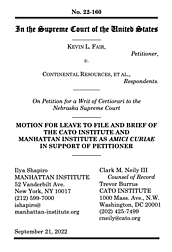Learn more about Cato’s Amicus Briefs Program.
Kevin Fair owned a home in Nebraska worth $60,000. But when he was unable to pay his $588.21 property tax bill, the government put a tax lien on the property and sold it to a private party, Continental Resources. Continental paid the taxes on it, and then foreclosed on Mr. Fair, seizing his home. In most states, when someone does not pay their property taxes, the government may take the property, sell it to pay off the tax debt, and then return whatever is left back to the homeowner. But in fourteen states, including Nebraska, the government can keep the property or sell it to a private party. This often impacts the poor and elderly—people who own their home free of a mortgage but do not have enough discretionary income to pay their property taxes.
Does it violate the Constitution when the government doesn’t return the remaining surplus of a home after paying off the taxes? The Fifth Amendment requires that when the government takes property for a public use, it must pay the property owner just compensation. This requirement of just compensation applies regardless of whether the property is land, money, or an intangible asset like equity in a home.
After Continental foreclosed on him, Mr. Fair sued, arguing that Nebraska took his equity and gave it to Continental. His case went up to the Nebraska Supreme Court, but that court said Nebraska did not take his property because the home equity was not Mr. Fair’s private property. This holding was unconstitutional and the court essentially sanctioned Nebraska’s taking of Mr. Fair’s home equity. Mr. Fair, who is represented by the Pacific Legal Foundation, has petitioned the U.S. Supreme Court to hear his case, and Cato, joined by the Manhattan Institute, has filed an amicus brief on his behalf. The brief argues the Nebraska Supreme Court erred in holding that Mr. Fair did not have a property right in his remaining equity because prior Nebraska Supreme Court decisions had held otherwise. These prior Nebraska cases made clear that the surplus equity in a home is a property right, and when the Nebraska Supreme Court disavowed that property right in this case, it upheld a taking.
The Court should take Mr. Fair’s case and correct the fourteen states that allow these unconstitutional takings. This taxation policy is oppressive, and nobody should lose his entire home and the equity because he couldn’t pay $588 in taxes. Nebraska is taking from the poor to feed the coffers of private corporations. This is unconstitutional and the Supreme Court should stop it.

This work is licensed under a Creative Commons Attribution-NonCommercial-ShareAlike 4.0 International License.


